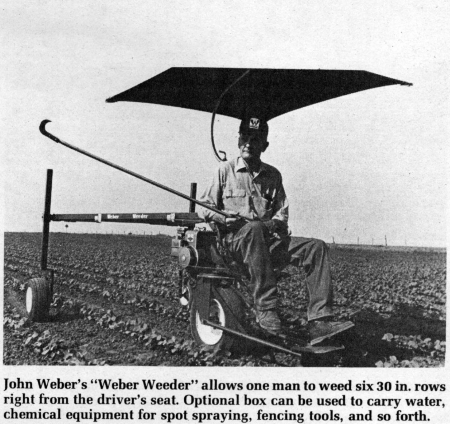
"Runs all day on a gallon of gas," says John Weber, Anchor, Ill., inventor and manufacturer of the Weber Weeder.
The operator keeps his foot on the clutch and swings it right or left to steer the machine, leaving the other foot free to hit the brake pedal for quick stops. A hand-operated collapsible steering wheel is pulled up to negotiate sharp end turns. After turning, the steering wheel drops down and out of the way, making it easy for the operator to get on and off the machine to chop or spot spray patches of weeds. Right from the seat, he can weed six 30-in. rows, or four 38 to 40-in. rows, at a time. Rear wheels adjust to any row width. The adjustable, telescoping frame can be raised to 4.5 ft. to clear mature soybeans, corn in the pre-tassel stage, and other advanced row crops. It's powered by a 5 hp Briggs and Stratton engine.
Weber has sold a number of machines to farmers who, because of health or leg problems, couldn't be in the field if it wasn't for a machine like his. "Now they're riding up and down fields all day long, and going all over the farm to check fences and crops, without violating doctor's orders not to do any walking," Weber points out.
Other owners have discovered a host of new uses for the go-anywhere machine. They're using it to cut herbicide costs by spot spraying fields selectively, where needed, to control patches of cockleburs or other problem weeds, for checking crops or irrigation pipe, picking rocks, fixing fence or working cattle.
